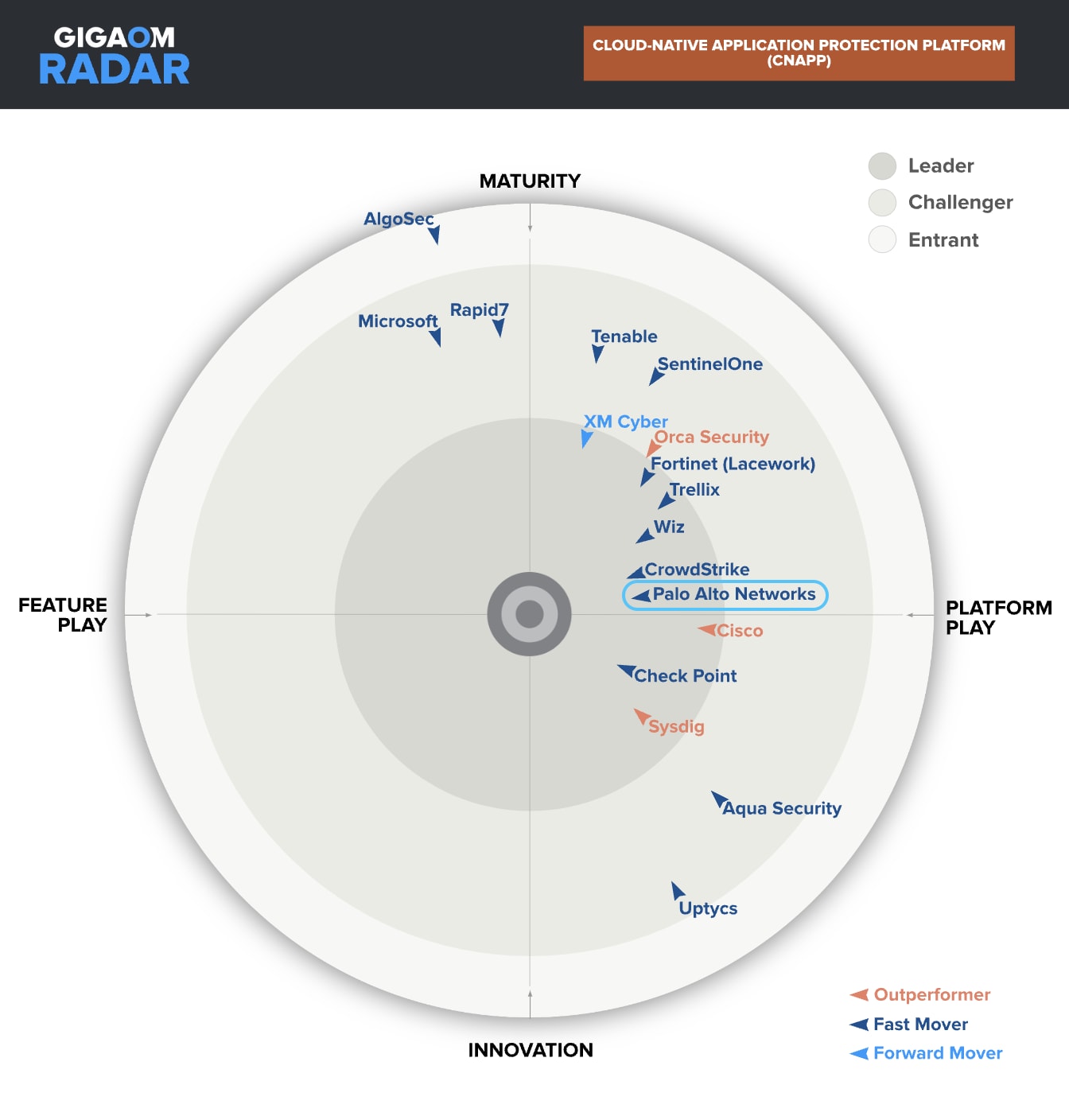
Amid the crowded and complex landscape of cloud-native application protection platforms, Prisma Cloud once again distinguishes itself as a leader.
In the inaugural GigaOm Radar for Cloud-Native Application Protection Platforms, analyst Chris Ray breaks down the CNAPP market, evaluating 17 of the top solutions, comparing key and emerging features, as well as business criteria. The report's aim is to give an overview of the market, identify leading CNAPP offerings, and give leaders the tools needed to evaluate their options and make informed investment decisions.
Securing the Cloud-Native Future
When Palo Alto Networks introduced Prisma Cloud, it set out to address a critical challenge faced by organizations adopting cloud technologies: securing applications and infrastructure across the entire cloud-native application lifecycle. The challenge stemmed from the increasing complexity of cloud environments, the rapid pace of development, and the need for comprehensive security that could keep up with the dynamic nature of cloud-native applications.
Palo Alto Networks recognized that the challenge required developing a unified platform that could provide end-to-end security from code to cloud. This pioneering approach, now known as cloud-native application protection platform (CNAPP), combines various security capabilities into a single, integrated solution.
These principles have shaped Prisma Cloud into a platform that not only detects and alerts but also prevents threats and empowers developers to build secure applications at speed. The industry has taken notice of Prisma Cloud's progress.
GigaOm has recently showcased Prisma Cloud’s leadership in their inaugural CNAPP Radar report, recognizing Palo Alto Networks unmatched vision and commitment to securing the future of cloud-native environments.
Let’s unpack the key insights from the GigaOm Radar report, examining why Prisma Cloud excels as a CNAPP and exploring indications on the broader evolving market category.
Key (Differentiating) CNAPP Features
The CNAPP market has rapidly evolved in recent years, with platforms continuing to innovate and add new features. But, with core capabilities — cloud security posture management (CSPM), cloud runtime protections, cloud workload protections, vulnerability management, integrated visibility and control, threat detection and response, and DevOps security — now considered widely adopted and well implemented within CNAPPs, what key features set these solutions apart?
The GigaOm report defines the following capabilities as key differentiating features:
- Cloud infrastructure and entitlement management (CIEM)
- Configuration drift detection
- Visualization of asset relationships
- API security
- Supply chain security
- Customer-built security policy
- Security automations and orchestrations
In the key features category, Prisma Cloud accumulated the highest average score (4.4 out of 5 stars). GigaOm notes:
“Prisma Cloud excels in a number of areas, all of which scored a 5/5. Its CIEM capabilities are excellent, offering net-effective permission calculations, least privilege recommendations and just-in-time access control.”
Additionally, GigaOm recognized Palo Alto Networks for stand-out risk prioritization:
“The solution’s [Prisma Cloud's} visualization feature set stands out as being one of the few in the market that can be tuned in real time to isolate noise or focus on specific technologies, the relationships impacting risk and associated attack vectors for that technology.”
Emerging Features
Where is the market going? What must-have features can we expect to see in the next 12-18 months?
GigaOm highlights three capabilities we can expect to become widely adopted:
- Threat hunting and anomaly detection
- eBPF-based security
- Resource behavior monitoring
Prisma Cloud scored 5 out of 5 stars for resource behavior monitoring and 4 out of 5 stars for threat hunting and anomaly detection, as well as eBPF-based security.
“It [Prisma Cloud] also does resource behavior monitoring very well, performing behavior analysis through autonomous learning across Prisma Cloud. The crowdsource approach creates allow-lists for expected workload behaviors across all runtime sensors, providing comprehensive behavior analysis.”
Business Criteria
Having advanced and differentiating capabilities won’t serve an organization if they aren’t easy to use, scalable and cost effective, which is why GigaOm evaluates tools on key business criteria, such as:
- Scalability
- Cost
- Ease of use
- Flexibility
- Compliance
Prisma Cloud scored 5 out of 5 for scalability and ease and 4 out of 5 in the other three categories. According to GigaOm, “Prisma Cloud scores well on ease of use, as it features simple onboarding with minimum required permissions, streamlined investigations, click-through query building, natural language searches and an AI copilot for vulnerability prioritization and product assistance.”
Learn More
Don’t miss this informative report. Be sure to download GigaOm Radar for Cloud-Native Application Protection Platforms (CNAPPs) today. And if you haven’t tried Prisma Cloud, we invite you to experience best-in-class code to cloud security with a free 30-day Prisma Cloud trial.